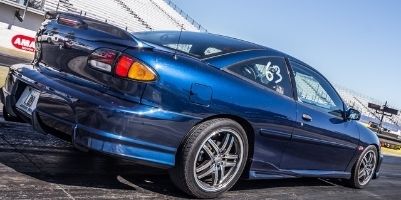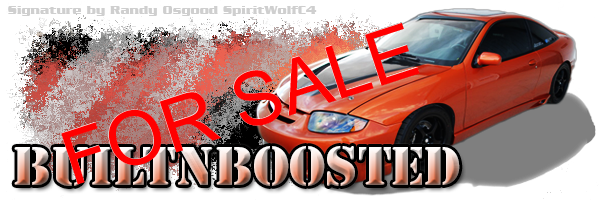Ok, well now that i have done a bite more research and understand things a little better here..... I realize we are all right, and all wrong at the same time....
Turbos and Superchargers all work on the same math... it is just different in how it gets there.
As far as the whole CFM / PSI debate... it is the same across the board... it is all about the basic priciples of hydraulics.
pressure is the resistance to flow. the more you flow the lower your pressure.... less you flow the more pressure.
So when you compare one turbo to another like you all were above... you really arent being fair.... The turbo itself is only one leg of a bar stool...
YES at 12PSI a GT25 might make 230HP. And at 12 PSI a GT45 might make 400HP.... but that totally depends on what is it bolted to.
If you put both turbos on a V8... then yes... the HP figures might be right... But i would bet my granny that the GT25 wont make 12PSI on a V8.
if you put both on a 2.4L LD9.... you get the same... the 12psi and 230hp might be accurate for the GT25.... but a GT45 on an LD9 would more than likely be WAAAY above 12psi.
It is indeed about CFM.... the VOLUME/MASS of air that is being moved.... air mass determines horsepower. if you have X amount of air... you can squirt X amount of gas, and make X amount of power.
So you decide how much power you WANT... then you can tell how much air you need.
then you find a turbo that can flow that CFM....
AND THEN you get to the compressor maps and your engine....
i am just making some figures up off the top of my head here..... but just for example....
say i want to make 400hp with my LD9.... that requires 200cfm lets say....
well if i have a completely stock car... it might be quite a chore cramming 200CFM through it. you might be talking 20-30psi... (due to the restictive flow of the stock parts)
mind you it is still the same AMOUNT of air... but the restrictions of the engine would be like putting your thumb over the tip of a garden hose. water still comes out.... but with alot more speed and pressure.
Say we spend some money and get the engine breathing... port the head, valve work, good intake manifold, etc etc... now that 200cfm moves thru it better... so that same 200 CFM now only makes 15psi....
So you look at the compressor map.... your peak horsepower goal would be plotted along the bottom left to right.... based on air needs... but then the pressure (based on cramming that much mass into your engine) is shown up and down...
so if you wanted to make 400hp peak... lets say it puts you SMACK center of the map... (right to left center) but then you need to plot your up and down based on your engines flow. so a better flowing engine will sit lower on the map.... a more restrictive one will sit higher...
This is all just talking about peak HP now.... just a single point on the map. well you want to pick a compressor who can make that CFM at that PSI the most effectively.... so you look at your "point" on several different maps till you find one that has a good efficiency island right where you want to be....
then you plot some other points for your engine... since you cant ALWAYS make peak HP, and you dont always drive at redline... so you draw a line to represent your engines air curve.... and then look at more maps to see if there is one that keeps pretty efficient thru most of your engines path...
if you go too far in one direction you get increased heat and IATs... which kill performance... go too far the other way and you risk damage to the turbo itself.
Think of it like traffic....
the road is the engine. the city is your air demand. each car is a air molecule.
if you have some little hick village of a town... you only need a little 1 lane dirt road to get the 20 farmers from work to the bar. (normally aspirated small displacement engine running 100hp @ 0 psi)
if you have New York City, you best have a superhighway infrasctructure ready to get the people home before they start a riot. (2000hp twin turbo V8 big block @60psi)
the more cars you can get home before dinner the better your "city" is. if no one makes it home for dinner... then all the wives bitch, and the next day everyone is crabby and the whole place goes to hell..
You want to get the people all home on time... the bigger the road the better... but you only have so much room to widen a road... yeah everyone would love a 8 lane highway to everywhere they wanted to travel... but no one wants to live by a 8 lane freeway.... or have to loose their backyard to build one.
so you make the road a lil wider... but then have to get creative.... cramming more cars onto the road makes everything tighter (more PSI). lots of psi is fine... until things get packed so tight that people start hitting eachother... then every accident causes further backups. too tight makes things real touchy....
a big turbo is just like adding more people to the city's work force... it is just that many more cars to get home... if you dont improve the roads to handle the higher trafic demands you will only hurt matters.
so to say "a gt45 makes 400hp at 12PSI" is like saying "i took me 5 hours to get home"
get home from where? how were you driving? what roads did you take? yeah to get from new york to pitsburg might take 5 hours... no shock there... or to walk from your house to the mall might take 5 hours...
so anyway... sorry for the novel... but needed to get this out of my head and in writting... so someone tell me if i am wrong here... this is what i have come up with from my research...


















